-
Ballet lessons bring health benefits to over-55s in France
Online classes with the Silver Swans are transforming lives of older adults
-
My life-changing French Erasmus exchange: From pro rugby player to lawyer
A former University of Edinburgh student shares how his year abroad led from playing rugby in Toulon to building a legal career in France
-
Profile: Dorothée - France's beloved TV icon and screen mum
Profile of the singer, actress and TV presenter who captivated millions of schoolchildren
Rugby exclusive: How France became the team to beat in World Cup
Former national rugby coach Philippe Saint-André tells us how ‘les Bleus’ were transformed into winners
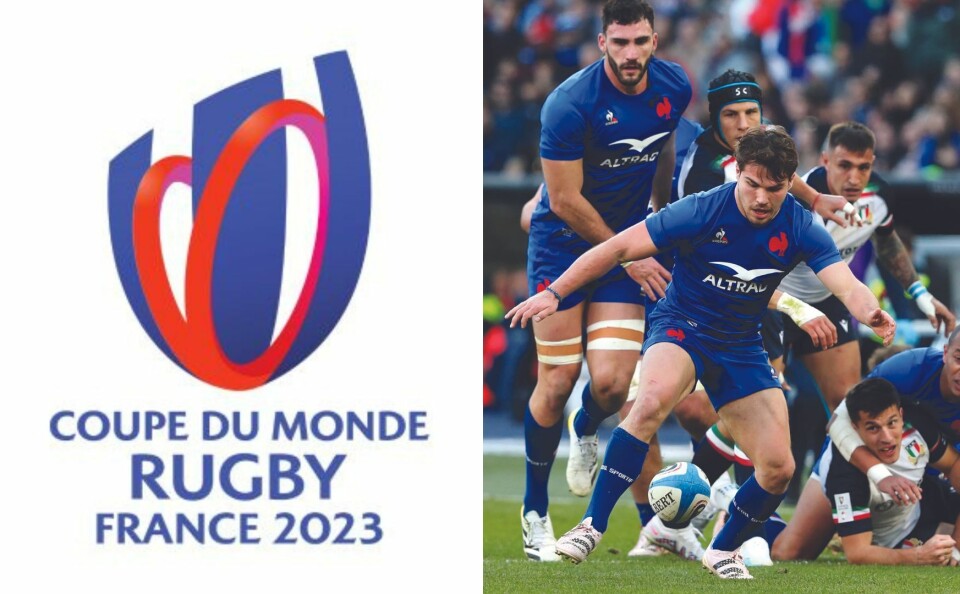
What a difference four years can make.
In 2019, France headed to the Rugby World Cup in Japan in something that appeared a lot like disarray.
They had finished fourth in that year’s Six Nations Championship, winning just two games out of five, and had lost two of the three November internationals in 2018.
It did not look positive for a nation charged with hosting the next World Cup in 2023.
Read more: How to watch the rugby world cup on French TV for free
France did just enough to save face in 2019
As the 2019 tournament approached, Bernard Laporte, then-president of the Fédération française de rugby (FFR), did his best to manage expectations, telling anyone who would listen that getting out of the pool phase should be considered ‘success’ enough.
Meanwhile, France’s coach, Jacques Brunel, was a lame duck, having agreed to step down after the tournament to give incoming coach Fabien Galthié a full cycle to prepare for a stronger push at the next World Cup.
In the end, ‘les Bleus’ laboured to the quarter-finals, where they came within minutes, and a Sébastien Vahaamahina red card, of beating Wales to reach the last four.
It was just enough to save face.
Read more: Rugby World Cup: Key points to check for visiting supporters
That was then
Today, 29 wins in 34 matches later, France head to the 2023 competition on home soil as favourites.
They finished second in this year’s Six Nations, losing only to Ireland, the number one-ranked side in the world, in Dublin.
Galthié will be among the first to admit that he has inherited a golden generation of players. However, it takes more than talent to win a World Cup and France have rarely had a shortage of that.
Rather, it takes strong leadership and cohesive, organised coaching, together with support from the federation, the clubs and fans. And, of course, good fortune also plays a part.
A golden generation is, frankly, a bonus.
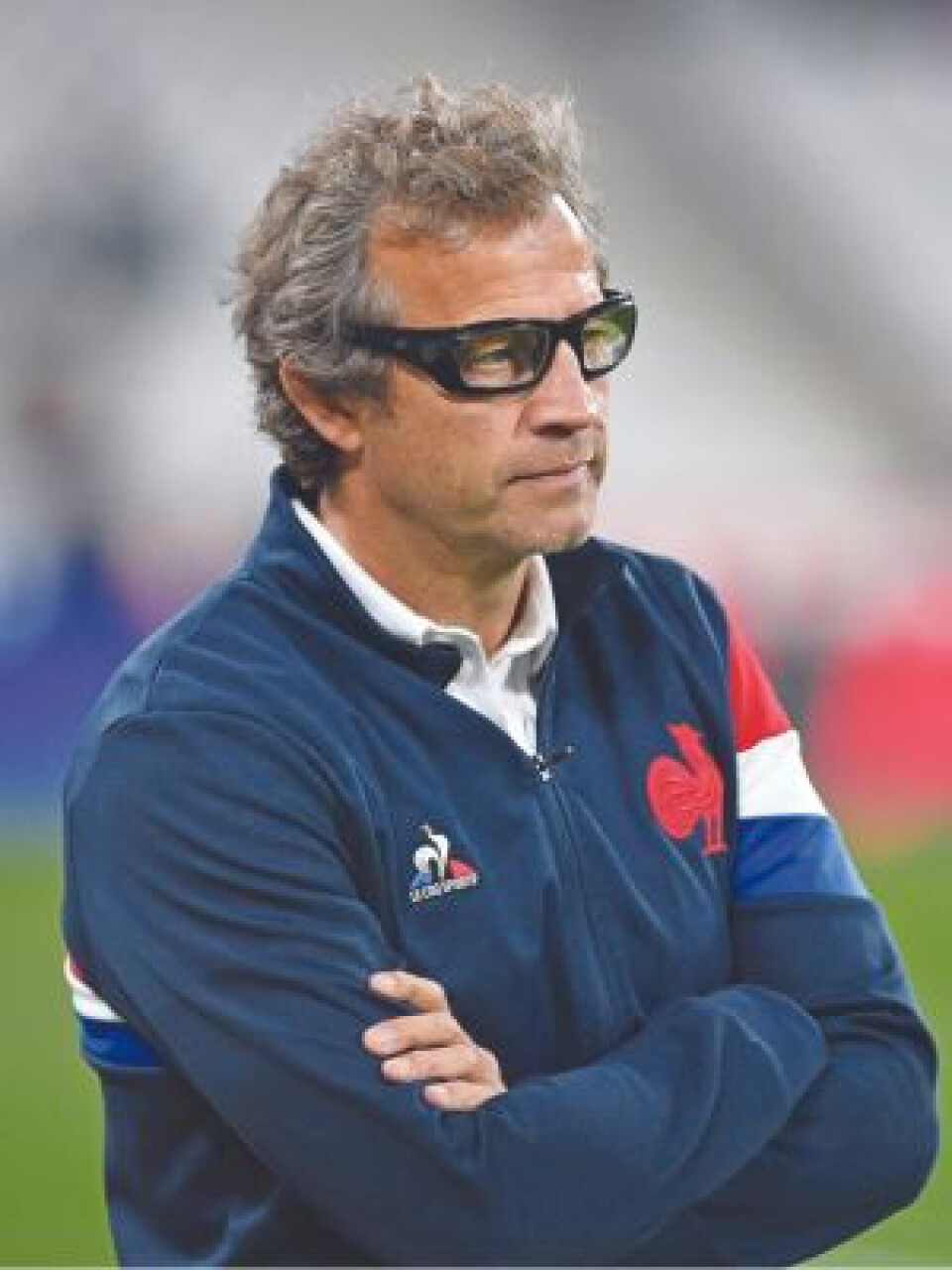
Photo: All eyes will be on French coach Fabien Galthié’s team; Credit: Newscom / Alamy
Now, France’s national team is more important than clubs
For Philippe Saint-André, who coached the national team between 2011 and 2015, the difference also comes down to a complete restructuring of how the game operates in France.
“We’ve put the church back in the middle of the village,” he says. “The French team’s priority players have time to recover. They have periods when they are only available to the national team.
“Now, a regular in the French team plays 12 or 13 games for his club, whereas previously they would play 20 or 25 times for their club, plus the French team.”
He insists the playing talent in French rugby was no less exciting during his tenure than it is today. What has changed beyond recognition, he says, is the framework surrounding it.
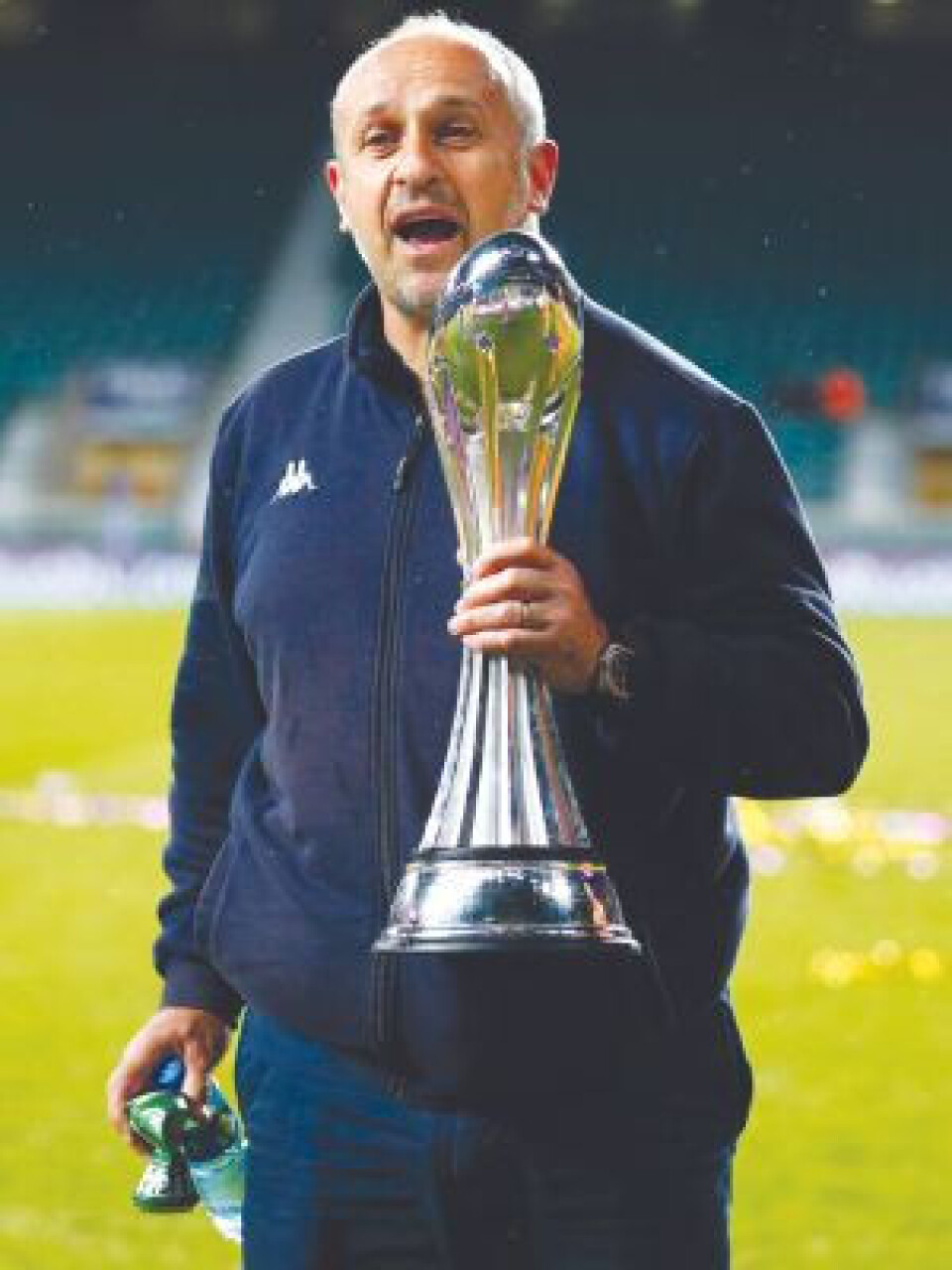
Photo: Former French Rugby Union star and ex-national coach, Philippe Saint-André, holding the Challenge Cup trophy after Montpellier beat Leicester Tigers at Twickenham in 2021; Credit: Action Foto Sport / Alamy
Club quotas for home-grown talent
In 2010, new rules were introduced to curb the number of overseas players flooding French clubs in order to increase the reservoir of talent for the national side.
The rules set a quota for the number of joueurs issus de la formation française (JIFF) in a match-day squad.
JIFF players are essentially those who have spent a certain number of seasons at a French club’s youth academy before turning 21 or who have been licensed to play in France for five seasons before the age of 23.
“Back then, you could be French champions with nine to 15 foreign players [on the pitch],” Saint-André explains.
“Toulon were French champions and had only two French players on the teamsheet.”
The structural changes go deeper than just players.
Club calendars organised around national team players
“The calendar has been reorganised, and players are no longer called upon to play for their clubs in international windows.
“They have recovery periods, development periods, preparation periods, periods when they are with their club, periods when they are only with the national team.
“The calendar has been designed to ensure that the best French players are as competitive as possible, so that they can play for the French national team and win trophies with the French team.”
‘Everyone’s pushing in the same direction’
None of this would have been possible without a sea change in relations between the FFR and the Ligue nationale de rugby (LNR), which runs the professional men’s game in France.
“There used to be constant disagreements,” Saint-André says. “When I was [France] coach, the FFR, the clubs and the league didn’t talk to each other. But now, everyone’s pushing in the same direction.”
Galthié has more access to his players than any previous coach. He can pick 42 ahead of every match. He can keep 28 for the game, for which he needs 23.
And he and his staff put the work in. They coordinate week-in, week-out on long and short squad lists. They also ‘train to train’, honing their coaching methods so that the time they have with players is not wasted.
France have ended losing streaks under Galthié
“We’ve given Fabien Galthié the means,” Saint-André says. “He’s got a top-notch staff, the best possible means to prepare for the World Cup.”
This cannot be dismissed as tournament host hype. 'Les Bleus' have gone from ‘top eight would be good’ in 2019 to genuine contenders in their home tournament.
Two years ago, a scratch summer side won in Australia for the first time in a generation.
France have, under Galthié, ended losing streaks in Dublin, London, Cardiff, and Edinburgh.
At home, they have beaten New Zealand, South Africa, Argentina, Georgia and Japan.
Indeed, they have not lost a match in France since the rescheduled final round of the 2021 Six Nations against Scotland.
Form like that means Saint-André is far from alone in his belief that France are on course for the Webb Ellis trophy.
Read more: Video: All Blacks’ haka tribute at New Zealand war graves in France
‘We do not want Ireland until the final’
“I think it will be France because they are the second-ranked nation in the world, and because they are hosts,” he said.
“Of course, New Zealand are always there, and so are South Africa,” he adds.
So, too, are Ireland, a team Saint-André would prefer France avoids until the final.
“The opening France-New Zealand match on September 8 is important,” he says of the hosts’ route out of the pool phase.
“But, after that? The most important thing is to win the quarter-final, because we’ll play either South Africa or Ireland.
“It’s better to face South Africa in the quarter-finals and Ireland in the final because, as a general rule, South Africa is a squad that gets better.
“The tougher the matches, the stronger they become.”
Nevertheless, he believes France, who have lost three World Cup finals, now have the quality both on and off the pitch to go one better than their counterparts in 1987, 1999, and 2011.
Read more: Three world cup All Blacks delight Lyon restaurant - and eat for 12
‘French Captain, Dupont, is best player in world’
For Saint-André, one man will be a “determining factor”: Antoine Dupont.
The French captain is widely regarded as one of the greatest players of all time, having won the World Rugby Men’s 15s Player of the Year award and three Six Nations Player of the Championships, the most by a French player.
He has also taken home four trophies in his career, including two Top 14 titles, the European Rugby Champions Cup and the Six Nations.
“When he’s playing, he’s got an 80% win ratio,” says Saint-André.
“We’re starting the World Cup with the best player in the world on our side, not in a team we’re playing. That’s a reassuring sign.”
That said, and although rival teams build their gameplans around stopping the Toulouse scrum-half, Saint-André insists Les Bleus are far from a one-player squad.
“[Prop] Uini Atonio is important too. Grégory Alldritt [typically the number eight in France’s back row] is important. The two Toulouse hookers [Julien Marchand and Peato Mauvaka] are important.
“Never has a French team arrived at a World Cup with such a wealth of players, with players who were world champions at under-20, who have been programmed to win.”
Future of French rugby looks bright too
In July, the men’s under-20 squad claimed the World Rugby U20 Championship title for a third time in as many competitions, beating Ireland 50-14 in the final to emulate their counterparts from 2018 and 2019.
Several of those 2018 and 2019 champions, including Romain Ntamack [now injured], Arthur Vincent and Cameron Woki, have already made the step up to the senior squad.
The 2023 cohort, led by Lenni Nouchi, Marko Gazzotti, Baptiste Jauneau and Nicolas Depoortère, will no doubt be looking ahead to the 2027 World Cup in Australia with anticipation.
Clubs investing in coaching and training
In the meantime, clubs will continue to play their part in nurturing French talent.
They are driven by the increasingly tight JIFF rules, which today limit clubs in the Top 14 and ProD2 to 13 non-JIFF players in their senior squad and set a minimum average of 16 JIFF players per matchday 23.
“As a result, we’ve invested in training, we’ve invested in our training centres, in our academies,” says Saint-André.
“We have some very good coaches and we do everything we can to develop our young people, our best players, our youth and those who represent the club. And then, of course, the French team.”
English coach will take over a humble Montpellier
Saint-André himself is stepping back from day-to-day management of Montpellier to become the club’s director of rugby again.
On his watch, Montpellier won a second Challenge Cup in 2021 and the Top 14 title for the first time in their history in 2022.
However, last season, their first as French champions, was more difficult.
They finished 11th in the league and never seriously looked like challenging for the title.
Saint-André was always a reluctant coach at Montpellier. He only put on the tracksuit again after Xavier Garbajosa was sacked in early 2021, intending to step down from his suited-and-booted director role only for a short interregnum period.
However, plans to bring Franck Azéma from Clermont in as a replacement ran aground, extending his coaching run longer than he had anticipated.
“I’ve been on the touchline for three years, and it will be good to take a step back,” Saint-André says.
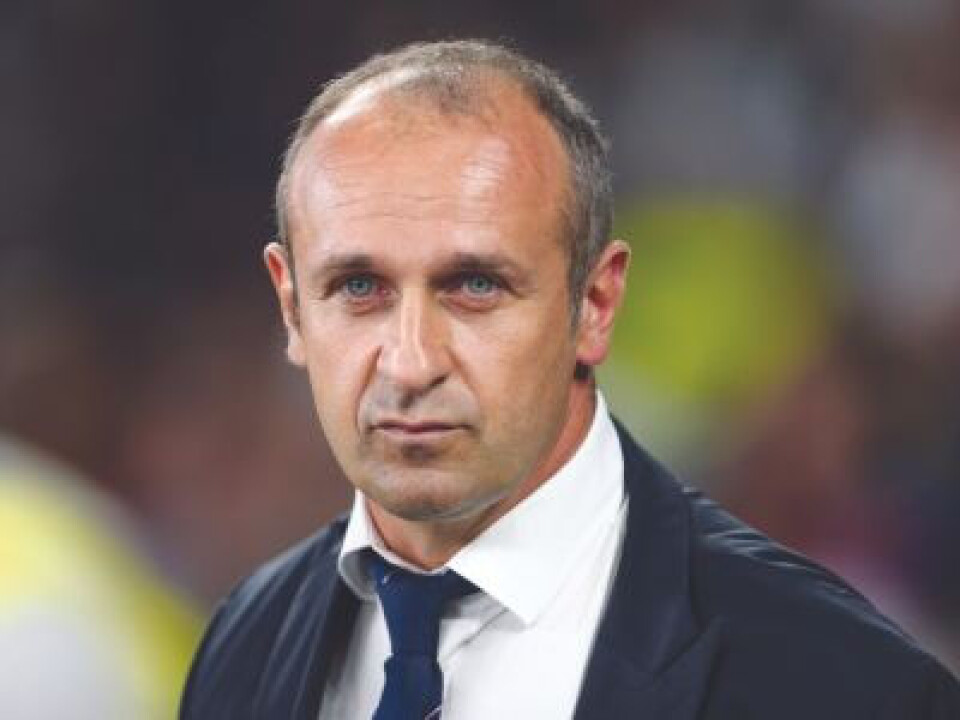
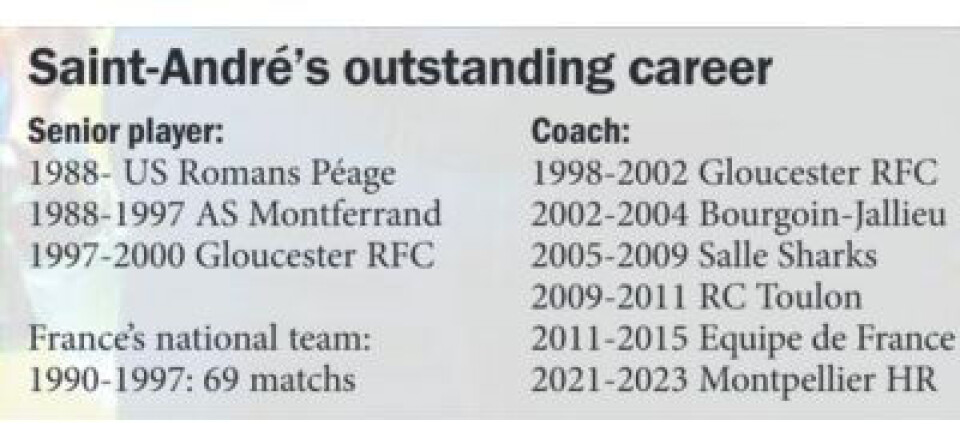
Photo: Philippe Saint-André; Credit: PA Images / Alamy
“[English coach and former player] Richard Cockerill will take over a team that’s very humble, because we’ve had a complicated season.”
French players have risen through punishing league
It is regularly claimed that the French league is a meat grinder.
It runs for 10 months of the year, over 26 rounds, plus three weeks of play-offs. There is little respite, but that is what makes it so special, Saint-André insists.
“It’s the toughest, the most competitive [league] – the longest in world rugby.
“There’s never an easy match, so it’s a competition where you fight. You can’t let your intensity drop by 15% or 20%, or you will get punished.
“That’s what makes the Top 14 so beautiful, so hard, so tough, so difficult.”
‘France can become world champions’
But the question on everyone’s lips is not concerned with the league, but rather World Cup triumph.
And of that Saint-André has no doubt. “The World Cup is coming to France,” he says.
“It’s going to be difficult, it’s going to be complicated, it’s going to be tough.
“However, there are certainties, and one is that France is among four nations that can become world champions.”
See all the key dates for the Rugby World Cup here:
To see the picture in high resolution, follow this link.
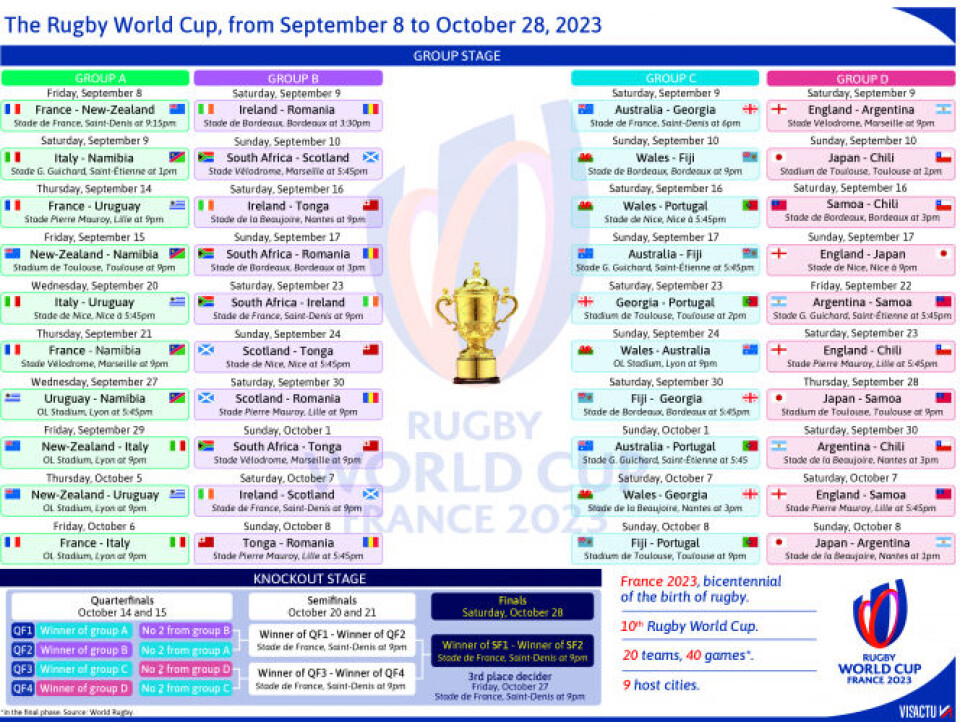
Related articles
UK military rugby player death at Dinard cliff due to accidental fall
‘France’s rugby is a metaphor for its culture and art de vivre’
Language learner spotlight on florid French of rugby's Ronan O’Gara
























